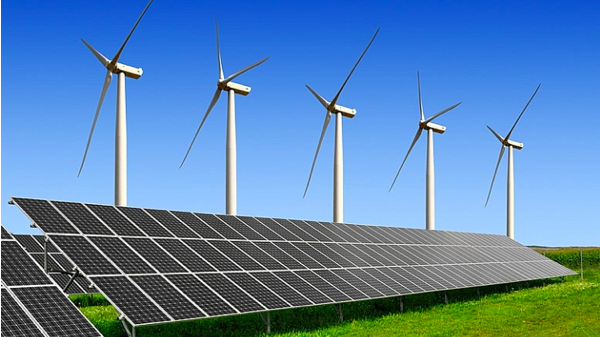Policies for the development of renewable energy in Vietnam Until 2030, with a vision to 2050
Below are the mechanisms and policies for the development of renewable energy in Vietnam until 2030, with a vision towards 2050.

Policies for the development of renewable energy in Vietnam Until 2030, with a vision to 2050 (Internet image)
Policies for the development of renewable energy in Vietnam Until 2030, with a vision to 2050
The renewable energy development policies of Vietnam by 2030, with a vision to 2050, are outlined in Decision 2068/QD-TTg of 2015 as follows:
* Formation of a Renewable Energy Market:
- Prioritize investment and use of renewable energy in the energy sector development, serving as a basis for developing and promoting a renewable energy market.
- Encourage organizations and individuals of various ownership types to participate in the development and use of renewable energy. The state guarantees the legitimate rights and interests of organizations and individuals engaged in developing and using renewable energy.
* Electricity Pricing and Investment Assurance Policies in Vietnam:
- The Ministry of Industry and Trade shall develop and submit to the Prime Minister for approval the electricity tariffs applicable to grid-connected renewable energy electricity projects. Electricity sale prices should match the conditions of different regions and the characteristics of power generation technologies from various renewable energy sources, adhering to principles that promote the development and use of renewable energy, ensure cost recovery, and provide reasonable profits for investors. The electricity sale price should be adjusted promptly to fit the development of technologies using renewable energy sources.
- Power units have the responsibility to purchase all electricity generated from grid-connected renewable energy sources within their management areas. The electricity purchase is carried out through a sample power purchase agreement stipulated by the Ministry of Industry and Trade.
Purchase costs for electricity from renewable energy projects are accounted into the electricity cost of the power units and are appropriately reflected in the retail electricity price structure, to be recovered through electricity sales revenue.
- Electric power projects using renewable sources for electricity production are prioritized for connection to the national power grid. The connection costs and reasonable related expenditures incurred by the grid units (transmission and distribution units) due to the purchase of electricity from renewable sources shall be included in the transmission and distribution costs of the grid units.
- For independent power systems using renewable energy sources for electricity production, the investor shall develop a tariff plan and determine the total level of support from the state budget for submission to the Ministry of Industry and Trade for appraisal and the Prime Minister's approval. The total level of support is extracted from the Sustainable Energy Development Fund.
* Responsibilities of Organizations and Individuals in the Electricity Sector:
- Generation units with an installed capacity greater than 1,000 MW (excluding BOT investments) must produce electricity from renewable energy sources (excluding hydropower sources over 30 MW). By 2020, this cannot be less than 3%; by 2030, not less than 10%; and not less than 20% by 2050.
- Distribution units must have a power production and procurement ratio from sources using renewable energy, and end-user customers must also self-produce from renewable energy sources (excluding hydropower sources over 30 MW), achieving no less than 5% by 2020, no less than 10% by 2030, and no less than 20% by 2050.
- The Ministry of Industry and Trade shall establish the minimum renewable energy ratios for electricity production and distribution units annually.
* Net Metering Mechanism:
- End-users purchasing electricity from the national grid who develop renewable energy power sources mainly to ensure their electricity needs qualify for the net metering mechanism.
- Distribution units are responsible for contracting electricity sales with end-users installing renewable energy power systems under net metering principles.
- The Ministry of Industry and Trade stipulates simple connection procedures to encourage end-users to invest, specifies valuation methods, and other necessary commercial agreements to balance the interests of end-users and electricity distribution and business units.
- Electricity output from renewable energy sources of end-users is counted towards the Renewable Portfolio Standard (RPS) of electric distribution and business units.
* Incentive Policies for Renewable Energy Development and Use in Vietnam:
- Projects for developing and using renewable energy sources benefit from investment credit incentives according to existing state laws on investment and export credit.
- Tax incentives:
+ Import tax: Projects developing and using renewable energy sources are exempt from import tax on goods for fixing assets; imported goods are materials, supplies, and semi-finished products not produced domestically for the project's production according to existing export and import tax laws.
+ Corporate income tax: Exemption or reduction of corporate income tax for projects developing and using renewable energy sources is treated as investments in preferential sectors according to existing tax laws.
- Land incentives: Projects developing and using renewable energy sources are exempt from or receive reductions in land levy or rent according to existing laws applicable to preferential investment sectors.
- Priority is given to studies related to the development and use of renewable energy resources within science and technology development and high-tech industrial development. Funding from various funds supports scientific and technological research projects, pilot projects, and industrialization for renewable energy development and utilization, promoting technological advancements related to renewable energy development and use, reducing production costs of renewable energy products, and improving product quality.
* Environmental Protection Policies in Vietnam:
- Organizations and individuals using fossil fuels for energy purposes must pay environmental fees corresponding to the amount of fuel used. Part of the environmental fee goes to encouraging the development and use of renewable energy sources through the Sustainable Energy Development Fund.
- Key word:
- renewable energy
- Vietnam
- Cases of land rent exemption and reduction under the latest regulations in Vietnam
- Economic infrastructure and social infrastructure system in Thu Duc City, Ho Chi Minh City
- Regulations on ordination with foreign elements in religious organizations in Vietnam
- Increase land compensation prices in Vietnam from January 1, 2026
- Determination of land compensation levels for damage during land requisition process in Vietnam
- Who is permitted to purchase social housing according to latest regulations in Vietnam?
-

- Number of deputy directors of departments in Vietnam ...
- 15:04, 05/03/2025
-

- Cases ineligible for pardon in Vietnam in 2025
- 14:43, 05/03/2025
-

- Decree 50/2025 amending Decree 151/2017 on the ...
- 12:00, 05/03/2025
-

- Circular 07/2025 amending Circular 02/2022 on ...
- 11:30, 05/03/2025
-

- Adjustment to the organizational structure of ...
- 10:34, 05/03/2025
-

- Notable new policies of Vietnam effective as of ...
- 16:26, 11/04/2025
-
.Medium.png)
- Notable documents of Vietnam in the previous week ...
- 16:21, 11/04/2025
-
.Medium.png)
- Notable documents of Vietnam in the previous week ...
- 16:11, 02/04/2025
-
.Medium.png)
- Notable new policies of Vietnam to be effective ...
- 16:04, 02/04/2025
-
.Medium.png)
- Notable new policies of Vietnam effective from ...
- 14:51, 21/03/2025

 Article table of contents
Article table of contents
